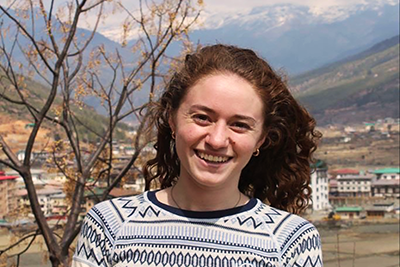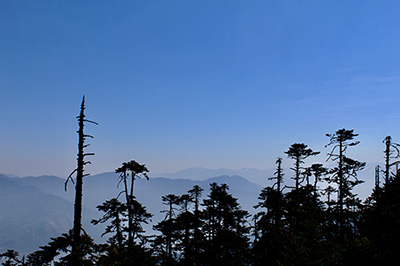Embracing stillness in the Himalayan Mountains
During her study abroad in Bhutan, Liddy Grossman ’23 was one of the first Americans to enter the country after the pandemic.

Liddy spent her spring semester upon the mountains in Bhutan.
Liddy Grossman ’23 knew she wanted her study abroad to be the experience of a lifetime.
“I wanted it to take me to a part of the world I would never normally have the chance to visit,” said Grossman, an environmental studies and international global studies major with a passion for sustainability.
After sitting down with her study abroad advisor and sharing her goals, her advisor recommended the School for Field Studies’ Himalayan Environment and Society in Transition in Paro, Bhutan. Grossman was hesitant at first, but after thorough research on Bhutan, she fell in love with the country.
“While this is a very competitive program, we knew Liddy would be the perfect fit for it,” said Alisha Cardwell, Director of Study Abroad. The program centers around environmental hands-on research with a focus on sustainability in Bhutan. Only a handful of students are selected for the program each year, but the office had confidence in Grossman. “She’s a great student with a lot of drive and a passion for the environment.”
Grossman was selected for the program, making her one of the first foreigners to enter the country of Bhutan in two years. “In order to protect the local culture, Bhutan allows a limited number of non-Bhutanese citizens into the country each year,” said Grossman. “It’s such an honor being among the first to enter the country again.”
With the uncertainty of COVID-19, Grossman was nervous that her study would be canceled. However, the program allowed students to travel to Bhutan under strict conditions. Upon arrival, Grossman was required to participate in a two week quarantine period. If she tested positive at any point while traveling, she would be turned away from the program.

As her semester concluded, Grossman took the time to share her favorite memories and highlights during her study abroad.
What courses did you take this semester?
I participated in mountain ecology, land use and national resources, and took a course on Dzongkha, the language of Bhutan. When courses concluded, we spent the final five weeks of the program participating in directed research out in the field. We attended lectures in the community forests, went hiking and camping in the mountains and engaged with people within the local village.
You mentioned your excitement for research. What was your research experience like?
My research focused on transitions in livelihood and development in the small village of Tsento Gewog. For years, Tsento Gewog was considered a small farming community in the Paro Valley, but the area has undergone a massive transformation in the past 50 years as Bhutan only opened itself to foreign visitors in 1974. Although the village is small in nature, it has become one of Bhutan’s main tourist attractions as it is home to the country’s most well-known heritage site, the Taktsang Monastery (known as the Tiger’s Nest).
For my general case study, I spent everyday talking with community members in the village about their experiences regarding how development and globalization has informed changes in local livelihood practices. We explored this through the tourism and agriculture industries and examined how these practices were impacted by conservation efforts and the COVID-19 pandemic. It was really fascinating learning more about local tradition and culture evolutions over time.
What was a typical day in your life in Bhutan?
The research center is based in a converted palace that was once home to the extended family members of the Royal Family. The space is beautifully decorated with ornate details and paintings of Buddhist iconography.
We woke up fairly early in the morning to enjoy breakfast. I really enjoyed eating this local potato curry dish each day. It’s made with spicy dried red chilies and eaten with a flatbread called poori. It was a wonderful way to start the morning!
While my days were very busy, they often moved at a slow, thoughtful pace. We typically had a packed agenda, but the program planned our days around engaging with fellow students and Bhutan community members.
Our courses took place in the local forest, where we participated in our own hands-on research and lectures completed outdoors. Upon completing class we went into town to speak with locals, grab a coffee, and take in the sights and sounds of Bhutan.
The days were quite structured, but felt more relaxed than back at home. Both the surrounding natural environment and culture of Bhutan is heavily influenced by Vajrayana Buddhism, which focuses on the practice of staying in the present moment. As someone who often has a packed schedule back at home, it took a great deal of time for me to get used to this shift, but it eventually became something that I learned to truly value throughout my experience.
What was your favorite part of the experience?
Bhutan is breathtakingly beautiful. It’s located within the mountains, so you’re surrounded by the beauties of the Himalayas. Getting to experience hikes, camping trips, and fieldwork in these beautiful forests was incredible

Grossman spent most of her semester in nature, conducting field research and hiking through the forest.
What is the biggest thing you will take away from your study abroad?
I’ve always had a passion for the environment, but my studies in Bhutan really narrowed in my focus on sustainable development for communities. I think the study of the environment and the impacts of climate change can be rather broad at times, but my experience here has definitely solidified my interest in environmentalism and its connections to development.
This program has taught me a great deal about topics ranging from sustainable global food systems to the ethics of green energy policy, and I look forward to expanding upon these interests both at Brandeis, and after graduation.
Categories: Humanities and Social Sciences, International Affairs, Student Life





